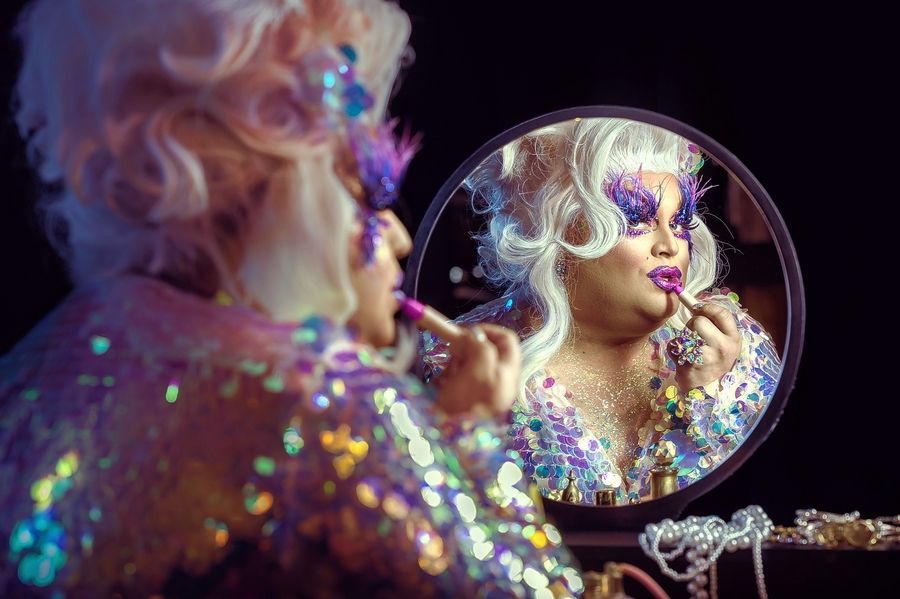Ginger Minj (she/her) was destined to play Albin in La Cage Aux Folles, the musical adaptation of the 1973 French play with the same name (which would later inspire the 1996 film The Birdcage). As a teenager growing up in Lake County, Fla., she would listen to the La Cage original cast album. She was even slated to perform the dual role of Albin and drag avatar Zaza at the young age of 18 in the early 2000s. Unfortunately, the production was shut down due to outrage and protests of local community members about the themes of the show. To this day, the show has not been performed in Lake County.
She had given up dreams of that specific role and instead threw herself into becoming a well-rounded theatre artist, while also pursuing a career as a drag performer, which led her to a spot on Season 7 of RuPaul’s Drag Race. But Albin/Zaza found their way back to her. It was in 2016, only a week after the Pulse shooting in Orlando, that Ginger was asked to perform the closing number of Act I, “I Am What I Am,” as part of the Logo Trailblazer Honors celebrating Harvey Fierstein, who wrote the book for the musical. Pulse was the nightclub that launched Ginger’s drag career, and the profound grief of the LGBTQIA+ community was palpable in the room as she performed. Footage of the performance shows Fierstein tearing up and the crowd leaping to its feet in a standing ovation.
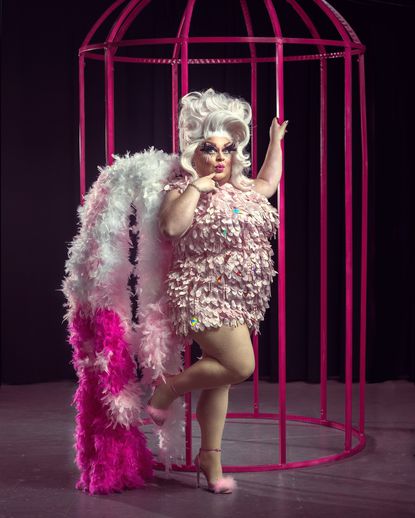
“That moment changed my life, and I know that sounds so melodramatic, but it’s true,” Minj said. “It’s a song that I grew up singing, it’s a song that I think speaks to anybody—not just queer people, not just drag queens—anybody who has ever felt different, which, let’s be honest, everybody in the world has felt out of place at some point. It’s just that little expression of, ‘It doesn’t matter who you are or where you come from, you’re really just great being yourself, as long as you embrace it.’”
Ginger remembers Fierstein finding her outside after the performance and telling her, “Oh honey, we’re all so proud of you.” (Fierstein recently opened up about his gender identity while doing press for his new memoir, I Was Better Last Night.)
After this performance, Ginger fielded multiple offers to play the role of Albin, but she found that most of the concepts focused too heavily on the drag aspects of the show and didn’t fully showcase the depth of emotion the role and the musical had to offer. When Kyle A. Dougan (he/they), producing artistic director of Music Theater Works in Wilmette, Il., reached out to Ginger, it felt like an ideal match. (The show is now running through April 3.)
“We are really delving in and giving you everything that’s written in the script, but through a different lens,” Minj said. “It is authentically queer, for the first time—it’s us, in charge of telling our own story, which is so important.”
Dougan’s husband and Project Runway alum Justin LeBlanc (he/him) is the show’s costume designer, and worked with the performers to create looks that feel authentic to them. For instance, in the show’s finale, as Albin and Georges take the stage, Ginger wears a gown instead of a tuxedo, traditionally the final costume of the character. Great care was taken to assemble the cast and creative team.
“It was really important to me that we had a team that represented our community, both behind the table and on the stage,” said Dougan. “So our Jacqueline is a Chicago star herself, Honey West, a trans actress in town who has been working in the community for many, many years. Our music director is trans. When we’re looking at some of these classic pieces, we’re also having to think about what that means musically, what it means artistically, and the conversations we’re having around the show.”
Community outreach and curating the audience experience has also been a top priority. The makeup team is visiting local LGBTQIA+ youth groups to teach makeup skills to queer and trans youth. Dougan has crafted a pre-show prologue with drag queens performing to club accordion music.
“I think, as an artistic director, that the experience is just as important as the theatrical piece,” Dougan said. He hopes that recreating aspects of nightclub culture will serve as an access point for younger audiences to feel welcomed and connected to the performance.
There is also a “Gingersnap” meet and greet offered to audience members to connect with Ginger and learn more about her life as a performer. Ginger reflected on the parallel between meet and greets with drag artists and her experiences early on in her career waiting at the stage door. She fondly remembers moments like Harvey Fierstein offering words of encouragement after a performance of Hairspray and Patti LuPone throwing barbs after a performance of Sweeney Todd. Both experiences motivated her to keep going with her own career.
Shortly before appearing on Drag Race, Ginger played Mrs. Lovett in Sweeney Todd at Orlando’s Clandestine-Arts. The production initially received a cease-and-desist order due to her casting, but this was quickly resolved when a video of Ginger performing the role in full makeup and costume was sent to composer/lyricist Stephen Sondheim, who personally signed off on her performance. As a non-binary performer, it was important to her to fight to have the opportunity to portray the role as a natural extension of her gender identity. Ginger has a bucket list of iconic musical theatre roles: Mama Rose in Gypsy, Dolly in Hello Dolly and the title role in Mame.
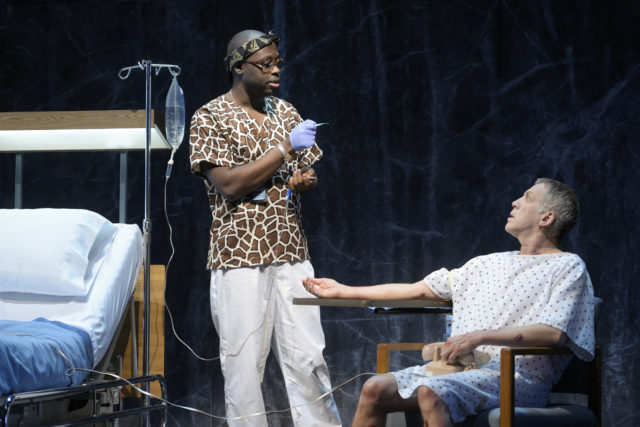
Indeed, most of the productions that have featured RuPaul’s Drag Race alums have been musicals. One notable exception is when Season Eight winner Bob the Drag Queen (she/her/he/him) was cast as Belize in Angels in America at Berkeley Repertory Theatre in 2018. Her audition came at the request of none other than playwright Tony Kushner.
The show marked her return to professional theatre after 10 years primarily focused on drag. Sharing the stage with Tony winners and LGBTQIA+ icons was intimidating at times, but Bob found the experience to be a rewarding one and hopes to revisit the role in the future. (King Herod in Jesus Christ Superstar is another role she said she’d like to try, and revealed that she is working on an original musical titled Harriet Tubman, Live in Concert.)
Bob studied theatre at Columbus State University, taking breaks to work in children’s theatres like CLIMB Theatre and Missoula Children’s Theatre. She moved to New York to pursue an acting career, and found herself writing parodies of plays and performing them in the New York cabaret scene. But one of her proudest accomplishments so far is rising to the top of the New York City drag scene. “It’s a very, very elite club, and I’ve been very lucky to be a big player in it.”
Bob also serves as a producer for the HBO series, We’re Here, which brings drag performances to small communities across the country. The creative process of choosing, rehearsing, and producing a number is shown in great detail.
“When you’re a drag queen, you have to be a makeup artist, a costume designer, a hair stylist, a writer, a producer, a promoter, a music curator,” Bob said. “Drag is one of the last truly underground art forms. The only way to learn drag is from another drag queen. Even clowns have colleges.”
The trend of Drag Race alums hitting the stage made it to Broadway in 2018, when Peppermint (she/her) originated the role of Pythio in Head over Heels. Broadway was always the goal for Peppermint, which is why she moved to New York City to study at the American Musical and Dramatic Academy. As a teenager, theatre had become a safe space for artistic expression, as it does for many LGBTQIA+ youth. After her time at AMDA, it was jarring to discover that the world of professional theatre didn’t necessarily operate in the same, welcoming way.
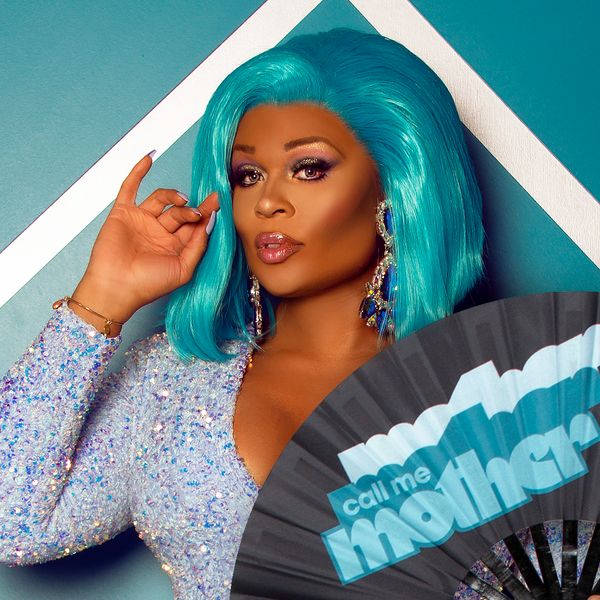
Finding traditional theatrical opportunities limited in New York, Peppermint honed her creative skills and wowed audiences in the drag scene. She has the distinction of the being the first openly transgender contestant to compete on the American franchise of RuPaul’s Drag Race (others have come out as trans during the course of competition or after filming their season. The current season has five trans contestants.)
After nearly winning the crown of Season 9, Peppermint was able to finally fulfill her dream of performing on Broadway. Going into rehearsals for Head over Heels, she knew that she wanted to bring her full self as an activist as well as a performer.
“I wanted to kickstart a lot of conversations that were not going on at the time in my circles,” she said. “I saw this as a big platform. A lot of eyes were on me at the moment, and I really wanted to engage in and publicly hold these conversations that were able to speak more broadly and more lovingly about non-binary folks and gender non-conforming folks and trans folks and queer folks in general in professional theatre.”
The larger question that Peppermint was and remains interested in is, “What is real inclusivity, and how far can it reach into professional theatre?”
She sees signs of change in the industry, noting more casting breakdowns actively looking for gender-diverse performers. She applauds companies and productions that have implemented the practices of hiring equity, diversity, and inclusion associates to advocate for the concerns for cast members. Peppermint urges playwrights and casting professionals to create space for transgender actors, especially for trans femmes of color, to have roles that fully embody the depth of their humanity.
“I would love to see queer roles, particularly Black, trans femme roles, written with more love and compassion and written as desirable,” she said. “It would be great for people like us to not just be the friend that is always providing support to everyone and always has the healing words to say to make everyone else feel better. It would be great if writers of theatre would see queer identities, identities that disproportionately are affected by the patriarchy and victims of toxic masculinity—I wish that those roles would be centered and seen as desirable romantically and socially and everything, because I believe that will have an impact on how were are treated in real life.”
RuPaul’s Drag Race has aired since 2009, and alums of the show have been showing up on stages nationwide for nearly as long. The practice of casting alums seems to have started with 2013 productions of The Rocky Horror Show at the Woodlawn Theatre in Texas. These have included contestants Sharon Needles (she/her), Alaska Thunderfuck 5000 (she/her), Willam (she/her), Phi Phi O’Hara (she/her), Ginger Minj, and Latrice Royale (she/her), as well as one judge, Michelle Visage (she/her).
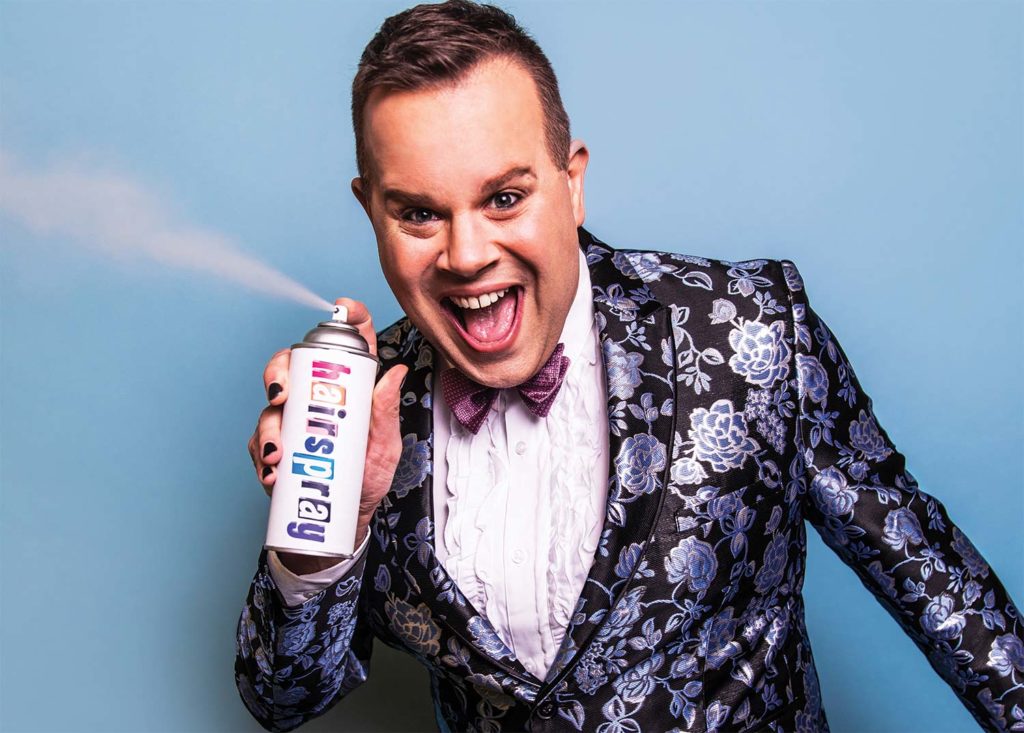
More recently, Season 6 winner Bianca Del Rio (she/her) played the role of Hugo/Loco Channelle in Everybody’s Talking About Jamie, and recently reprised the role in the North American premiere of the musical. Season 11’s Miss Congeniality Nina West (she/her) is currently touring the country as Edna Turnblad in the National Tour of Hairspray. And Australian audiences can see Season 6 finalist Courtney Act (they/she/he) as Elvira in Blithe Spirit, produced by the Sydney Theatre Company, starting next week.
Alums like Jinkx Monsoon (she/her in drag, they/them out of drag), BenDeLaCreme (she/her), Trixie Mattel (she/her), and Katya Zamolodchikova (she/her) are also contributing to the national theatre scene by touring original shows that mix elements of vaudeville, variety shows, concerts, and video shorts. These works are often previewed in Provincetown, R.I., during the summer.
But perhaps the most important legacy and lesson these Drag Race alums have to offer the theatre field at large is to value a wider range of performance experiences.
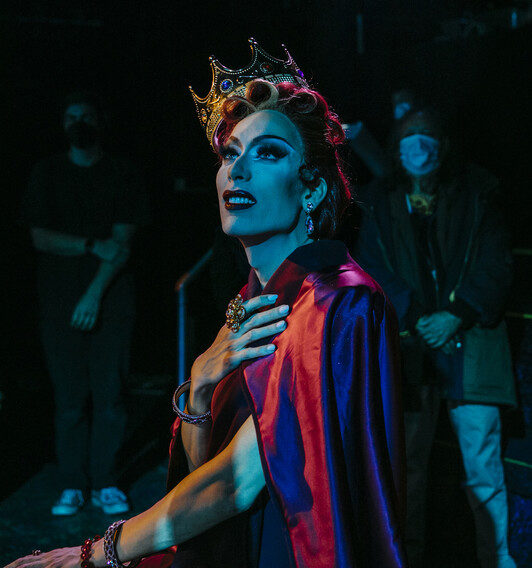
At the end of 2021, audiences had the opportunity to see RuPaul’s Drag Race All Stars Season 2 winner Alaska 5000 perform as Queen Gynecia in the Pasadena Playhouse production of Head Over Heels. Directors Jenny Koons (she/her) and Sam Pinkleton (he/him) spoke enthusiastically about collaborating with Alaska and about the importance of valuing the talents of performers from a variety of backgrounds.
“In a moment where every artist and institution and producing organization has their hot take on words like ‘diversity’ and ‘inclusion,’ one of the pieces that is frankly the most interesting to me, that I think is often left out of the conversation, is actually diversity of experience.” Pinkleton said. Koons agreed, adding, “What are the spaces that amazing performers are being drawn to, and how do we learn from that? How do we make our spaces more like that?”
Koons mused about how the cultural contribution of Drag Race alums can challenge and motivate theatres to make changes to empower performers to bring their entire selves into audition and rehearsal spaces.
The influence of RuPaul herself should not be underestimated, especially as she is responsible for final casting decisions for the series. The original series is currently in its 14th season, and the franchise has expanded to the United Kingdom, Canada, Holland, Spain, Italy, Thailand, Australia, and New Zealand, introducing dozens of LGBTQIA+ performers to audiences.
Said Koons, “RuPaul is a pillar of American theatre.”
K. Woodzick (they/them) is a theatre artist and journalist currently residing in Northern Wisconsin on Anishinabek land. They hold an MFA in contemporary performance from Naropa University, and their writing has appeared in Theatre Topics and HowlRound. They are the founder of The Non-Binary Monologues Project and host of the Theatrical Mustang podcast, which will return in April of 2022 (watch this space). More at www.woodzick.com.

